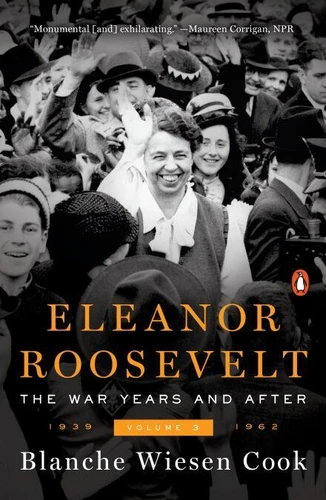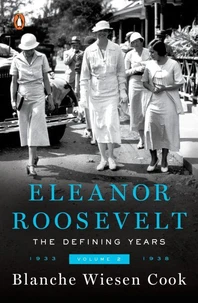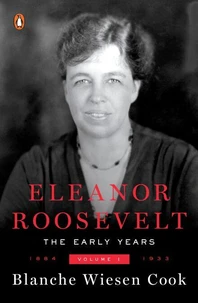Eleanor Roosevelt, Volume 3. The War Years and After, 1939 - 1962
Par :Formats :
Disponible dans votre compte client Decitre ou Furet du Nord dès validation de votre commande. Le format ePub protégé est :
- Compatible avec une lecture sur My Vivlio (smartphone, tablette, ordinateur)
- Compatible avec une lecture sur liseuses Vivlio
- Pour les liseuses autres que Vivlio, vous devez utiliser le logiciel Adobe Digital Edition. Non compatible avec la lecture sur les liseuses Kindle, Remarkable et Sony
- Non compatible avec un achat hors France métropolitaine
 , qui est-ce ?
, qui est-ce ?Notre partenaire de plateforme de lecture numérique où vous retrouverez l'ensemble de vos ebooks gratuitement
Pour en savoir plus sur nos ebooks, consultez notre aide en ligne ici
- Nombre de pages688
- FormatePub
- ISBN978-0-7352-2118-5
- EAN9780735221185
- Date de parution01/11/2016
- Protection num.Adobe DRM
- Taille12 Mo
- Infos supplémentairesepub
- ÉditeurPenguin Books
Résumé
One of the New York Times's 100 Notable Books of 2016One of NPR's 10 Best Books of 2016"Heartachingly relevant...the Eleanor Roosevelt who inhabits these meticulously crafted pages transcends both first-lady history and the marriage around which Roosevelt scholarship has traditionally pivoted." -- The Wall Street Journal The final volume in the definitive biography of America's greatest first lady. "Monumental and inspirational.Cook skillfully narrates the epic history of the war years.
[a] grand biography." -- The New York Times Book ReviewHistorians, politicians, critics, and readers everywhere have praised Blanche Wiesen Cook's biography of Eleanor Roosevelt as the essential portrait of a woman who towers over the twentieth century. The third and final volume takes us through World War II, FDR's death, the founding of the UN, and Eleanor Roosevelt's death in 1962. It follows the arc of war and the evolution of a marriage, as the first lady realized the cost of maintaining her principles even as the country and her husband were not prepared to adopt them.
Eleanor Roosevelt continued to struggle for her core issues-economic security, New Deal reforms, racial equality, and rescue-when they were sidelined by FDR while he marshaled the country through war. The chasm between Eleanor and Franklin grew, and the strains on their relationship were as political as they were personal. She also had to negotiate the fractures in the close circle of influential women around her at Val-Kill, but through it she gained confidence in her own vision, even when forced to amend her agenda when her beliefs clashed with government policies on such issues as neutrality, refugees, and eventually the threat of communism.
These years-the war years-made Eleanor Roosevelt the woman she became: leader, visionary, guiding light. FDR's death in 1945 changed her world, but she was far from finished, returning to the spotlight as a crucial player in the founding of the United Nations. This is a sympathetic but unblinking portrait of a marriage and of a woman whose passion and commitment has inspired generations of Americans to seek a decent future for all people.
Modest and self-deprecating, a moral force in a turbulent world, Eleanor Roosevelt was unique.
[a] grand biography." -- The New York Times Book ReviewHistorians, politicians, critics, and readers everywhere have praised Blanche Wiesen Cook's biography of Eleanor Roosevelt as the essential portrait of a woman who towers over the twentieth century. The third and final volume takes us through World War II, FDR's death, the founding of the UN, and Eleanor Roosevelt's death in 1962. It follows the arc of war and the evolution of a marriage, as the first lady realized the cost of maintaining her principles even as the country and her husband were not prepared to adopt them.
Eleanor Roosevelt continued to struggle for her core issues-economic security, New Deal reforms, racial equality, and rescue-when they were sidelined by FDR while he marshaled the country through war. The chasm between Eleanor and Franklin grew, and the strains on their relationship were as political as they were personal. She also had to negotiate the fractures in the close circle of influential women around her at Val-Kill, but through it she gained confidence in her own vision, even when forced to amend her agenda when her beliefs clashed with government policies on such issues as neutrality, refugees, and eventually the threat of communism.
These years-the war years-made Eleanor Roosevelt the woman she became: leader, visionary, guiding light. FDR's death in 1945 changed her world, but she was far from finished, returning to the spotlight as a crucial player in the founding of the United Nations. This is a sympathetic but unblinking portrait of a marriage and of a woman whose passion and commitment has inspired generations of Americans to seek a decent future for all people.
Modest and self-deprecating, a moral force in a turbulent world, Eleanor Roosevelt was unique.
One of the New York Times's 100 Notable Books of 2016One of NPR's 10 Best Books of 2016"Heartachingly relevant...the Eleanor Roosevelt who inhabits these meticulously crafted pages transcends both first-lady history and the marriage around which Roosevelt scholarship has traditionally pivoted." -- The Wall Street Journal The final volume in the definitive biography of America's greatest first lady. "Monumental and inspirational.Cook skillfully narrates the epic history of the war years.
[a] grand biography." -- The New York Times Book ReviewHistorians, politicians, critics, and readers everywhere have praised Blanche Wiesen Cook's biography of Eleanor Roosevelt as the essential portrait of a woman who towers over the twentieth century. The third and final volume takes us through World War II, FDR's death, the founding of the UN, and Eleanor Roosevelt's death in 1962. It follows the arc of war and the evolution of a marriage, as the first lady realized the cost of maintaining her principles even as the country and her husband were not prepared to adopt them.
Eleanor Roosevelt continued to struggle for her core issues-economic security, New Deal reforms, racial equality, and rescue-when they were sidelined by FDR while he marshaled the country through war. The chasm between Eleanor and Franklin grew, and the strains on their relationship were as political as they were personal. She also had to negotiate the fractures in the close circle of influential women around her at Val-Kill, but through it she gained confidence in her own vision, even when forced to amend her agenda when her beliefs clashed with government policies on such issues as neutrality, refugees, and eventually the threat of communism.
These years-the war years-made Eleanor Roosevelt the woman she became: leader, visionary, guiding light. FDR's death in 1945 changed her world, but she was far from finished, returning to the spotlight as a crucial player in the founding of the United Nations. This is a sympathetic but unblinking portrait of a marriage and of a woman whose passion and commitment has inspired generations of Americans to seek a decent future for all people.
Modest and self-deprecating, a moral force in a turbulent world, Eleanor Roosevelt was unique.
[a] grand biography." -- The New York Times Book ReviewHistorians, politicians, critics, and readers everywhere have praised Blanche Wiesen Cook's biography of Eleanor Roosevelt as the essential portrait of a woman who towers over the twentieth century. The third and final volume takes us through World War II, FDR's death, the founding of the UN, and Eleanor Roosevelt's death in 1962. It follows the arc of war and the evolution of a marriage, as the first lady realized the cost of maintaining her principles even as the country and her husband were not prepared to adopt them.
Eleanor Roosevelt continued to struggle for her core issues-economic security, New Deal reforms, racial equality, and rescue-when they were sidelined by FDR while he marshaled the country through war. The chasm between Eleanor and Franklin grew, and the strains on their relationship were as political as they were personal. She also had to negotiate the fractures in the close circle of influential women around her at Val-Kill, but through it she gained confidence in her own vision, even when forced to amend her agenda when her beliefs clashed with government policies on such issues as neutrality, refugees, and eventually the threat of communism.
These years-the war years-made Eleanor Roosevelt the woman she became: leader, visionary, guiding light. FDR's death in 1945 changed her world, but she was far from finished, returning to the spotlight as a crucial player in the founding of the United Nations. This is a sympathetic but unblinking portrait of a marriage and of a woman whose passion and commitment has inspired generations of Americans to seek a decent future for all people.
Modest and self-deprecating, a moral force in a turbulent world, Eleanor Roosevelt was unique.





